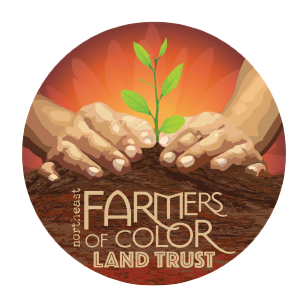WHY is the NEFOC Network members-only?
The NEFOC Network is a protected space intentionally created for Black, Indigenous, and People of Color (BIPOC) farmers, land stewards, and organizers. This decision is rooted in both our legal rights and our moral responsibility to uphold safety, healing, and joy for communities that have been historically- and systemically- excluded from land and food systems.
BIPOC individuals navigating predominantly white institutions often encounter microaggressions, stereotyping, tokenization, and racialized harm. Too many “inclusive” spaces still center whiteness, resulting in BIPOC voices being silenced, extracted from, or surveilled. We choose to build something different: a space where BIPOC land stewards can gather in strength, share resources, strategize collectively, and deepen relationships without needing to explain or defend their existence.
Legally, this Network is a private, expressive association.
As confirmed in legal review, it is not a public-facing or open-access service. It is a values-driven, mission-aligned membership network that exists to build collective power among BIPOC land stewards. That makes it protected under First Amendment principles of free association. Like other affinity-based communities rooted in shared identity and purpose, we have the right to create and maintain this space for and by those it is meant to serve.
We are creating safety, solidarity, and vision in the face of centuries of exclusion and extraction. To ask why BIPOC-only spaces exist is to overlook how deeply unsafe and unwelcoming dominant culture has been. As writer Kelsey Blackwell says, “we need spaces where we can simply be, without the white gaze—so we can remember who we are.”
The NEFOC Network is not a service, it’s a sanctuary.
It is a living ecosystem of mutual aid, political education, and land-based liberation for those who have been most dispossessed. We will continue to protect it as a sacred space of refuge and resistance.
For those seeking to understand more deeply, we invite you to explore the following resources:
"Creating Safe Spaces for BIPOC and LGBTQ+: Fostering Inclusivity and Empowering Marginalized Communities" (2023) - This article emphasizes the necessity of safe spaces for promoting inclusivity, mental well-being, and community building.
"In Pursuit of Racial Equality in American Psychoanalysis" (2023) - Examines systemic racism in psychoanalytic training and education, emphasizing the need for equitable spaces.
"Microaggressions and the 'Lived Experience' of Marginality" (2021) - Explores how microaggressions shape the daily experiences of people of color.
"BIPOC Need Space in the Workplace: 5 Ways to Help Create It" (2024) - Offers practical advice for fostering safe spaces in professional settings, including creating affinity groups and safe dialogue spaces.
"Me and White Supremacy" (book) by Layla F. Saad - A seminal work on understanding and combating white supremacy.
"Why People of Color Need Spaces Without White People" by Kelsey Blackwell - Provides insights into the necessity of BIPOC-only spaces.
"Dismantling Racism: A Resource Book for Social Change Groups" by Western States Center - Offers tools for addressing systemic racism.
"No, Black-only Safe Spaces Are Not Racist" by Cameron Glover - Addresses misconceptions about BIPOC-only spaces.
"Why Environmentalists Must Make More Space for BIPOC, and How We Should Do It" by Leesa Ko - Discusses the importance of inclusivity in environmental movements.
“How to Show Up in BIPOC-Only Spaces Without White Centering” (paid course) by Layla F. Saad
“Why there’s nothing racist about black-only spaces” by Charlie Brinkhurst-Cuff
“5 Reasons We Need Black-Only Spaces (And No, Reverse Racism Isn’t One of Them)” by Michal 'MJ' Jones
Racial Equity Tools: Caucuses and Affinity Groups (aggregated list)

